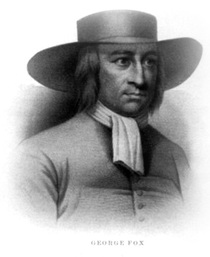The Religious Society of Friends began as a movement in England in the 17th century. Members are informally known as Quakers, as they were said "to tremble in the way of the Lord." The movement in its early days faced strong opposition and persecution, but it continued to expand across the British Isles and then in the Americas and Africa.
The Society of Friends, while always small in membership, has been influential in the history of reform. The state of Pennsylvania was founded by William Penn in 1682, as a safe place for Quakers to live and practice their faith. Quakers have been a significant part of the movements for the abolition of slavery, to promote equal rights for women, and peace. They have also promoted education and the humane treatment of prisoners and the mentally ill, through the founding or reforming of various institutions. Quaker entrepreneurs played a central role in forging the Industrial Revolution, especially in England and Pennsylvania.
During the 19th century Friends in the United States suffered a number of separations which resulted in the formation of different branches of the Society of Friends. Friends World Committee for Consultation (FWCC) estimated in 2007 there were 359,000 Friends worldwide.
Quakerism pulled together groups of disparate Seekers that formed the Religious Society of Friends following 1647. This time of upheaval and social and political unrest called all institutions into question, so Fox and his leading disciples--James Nayler, Richard Hubberthorne, Margaret Fell, as well as numerous others—targeted "scattered Baptists," disillusioned soldiers, and restless common folk as potential Quakers. Confrontations with the established churches and its leaders and those who held power at the local level assured those who spoke for the new sect a ready hearing as they insisted that God could speak to average people, through his risen son, without the need to heed churchmen, pay tithes, or engage in deceitful practices. They found fertile ground in northern England in 1651 and 1652, building a base there from which they moved south, first to London and then beyond. In the early days the groups remained scattered, but gradually they consolidated in the north—the first meeting being created in Durham in 1653—to provide financial support to the missionaries who had gone south and presently abroad. Before long they seemed a potential threat to the dignity of the Cromwellian state. Even arresting its leaders failed to slow the movement, instead giving them a new audience in the courts of the nation.
The Society of Friends, while always small in membership, has been influential in the history of reform. The state of Pennsylvania was founded by William Penn in 1682, as a safe place for Quakers to live and practice their faith. Quakers have been a significant part of the movements for the abolition of slavery, to promote equal rights for women, and peace. They have also promoted education and the humane treatment of prisoners and the mentally ill, through the founding or reforming of various institutions. Quaker entrepreneurs played a central role in forging the Industrial Revolution, especially in England and Pennsylvania.
During the 19th century Friends in the United States suffered a number of separations which resulted in the formation of different branches of the Society of Friends. Friends World Committee for Consultation (FWCC) estimated in 2007 there were 359,000 Friends worldwide.
Quakerism pulled together groups of disparate Seekers that formed the Religious Society of Friends following 1647. This time of upheaval and social and political unrest called all institutions into question, so Fox and his leading disciples--James Nayler, Richard Hubberthorne, Margaret Fell, as well as numerous others—targeted "scattered Baptists," disillusioned soldiers, and restless common folk as potential Quakers. Confrontations with the established churches and its leaders and those who held power at the local level assured those who spoke for the new sect a ready hearing as they insisted that God could speak to average people, through his risen son, without the need to heed churchmen, pay tithes, or engage in deceitful practices. They found fertile ground in northern England in 1651 and 1652, building a base there from which they moved south, first to London and then beyond. In the early days the groups remained scattered, but gradually they consolidated in the north—the first meeting being created in Durham in 1653—to provide financial support to the missionaries who had gone south and presently abroad. Before long they seemed a potential threat to the dignity of the Cromwellian state. Even arresting its leaders failed to slow the movement, instead giving them a new audience in the courts of the nation.
